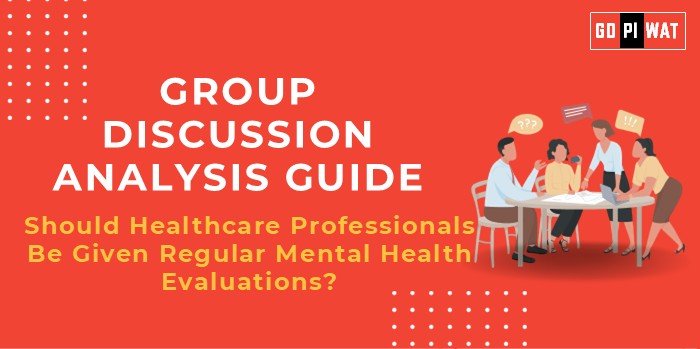📋 Group Discussion Analysis Guide: Should Healthcare Professionals Be Given Regular Mental Health Evaluations?
🌐 Introduction to the Topic
Opening Context: The healthcare profession is globally recognized for its immense stress and responsibility. With the rising focus on mental health, evaluating the psychological well-being of healthcare providers is critical to ensure patient safety and workforce sustainability.
Topic Background: Mental health concerns among healthcare professionals are not new. The World Health Organization (WHO) estimates that burnout affects more than 40% of healthcare workers globally, with significant repercussions on their performance and personal lives. The COVID-19 pandemic has further amplified these issues, making regular mental health evaluations a topic of contemporary relevance.
📊 Quick Facts and Key Statistics
- 🔥 Burnout Rates: Over 50% of physicians experience symptoms of burnout annually (WHO, 2023).
- ⚠️ Suicide Risk: Doctors have a suicide rate twice that of the general population (JAMA, 2023).
- 🌍 COVID-19 Impact: 70% of healthcare workers reported stress during the pandemic (Lancet, 2023).
- 💰 Economic Cost: Poor mental health among healthcare workers costs $1 billion annually in productivity losses (World Bank, 2023).
👥 Stakeholders and Their Roles
- Healthcare Institutions: Ensure supportive policies and regular assessments.
- Government Bodies: Allocate funding for mental health programs.
- Healthcare Workers: Participate in assessments and promote peer support.
- Mental Health Professionals: Design and implement evaluation programs.
🎯 Achievements and Challenges
✅ Achievements
- 🇬🇧 Some nations, such as the UK, have introduced mandated mental health support systems for healthcare professionals, showing reduced burnout rates.
- 🗣️ Programs like Schwartz Rounds in the US foster open dialogue and emotional resilience among healthcare teams.
🚧 Challenges
- 📉 Stigma: Many healthcare professionals avoid seeking help for fear of judgment.
- 💸 Costs: Implementing regular evaluations is resource-intensive.
- 🌐 Global Comparisons: While countries like the Netherlands excel in providing comprehensive mental health support for healthcare workers, others lag behind.
🛠️ Structured Arguments for Discussion
- Supporting Stance: “Regular mental health evaluations improve patient care by ensuring healthcare professionals remain mentally fit to perform their duties.”
- Opposing Stance: “Such evaluations could invade privacy and deter professionals from admitting to mental health struggles.”
- Balanced Perspective: “While evaluations are vital, they must be voluntary and coupled with stigma-free support systems.”
🗨️ Effective Discussion Approaches
📈 Opening Approaches
- Start with a striking statistic, e.g., “Over 50% of physicians report burnout annually…”
- Contrast the societal importance of healthcare with the lack of support for providers’ mental health.
🔄 Counter-Argument Handling
- Acknowledge privacy concerns but highlight anonymized reporting systems.
- Emphasize the balance between mandatory support and voluntary disclosure.
📋 Strategic Analysis of Strengths and Weaknesses
- ✨ Strengths: Improved patient care, reduced burnout, enhanced team dynamics.
- ⚠️ Weaknesses: High implementation costs, potential stigma.
- 🚀 Opportunities: Integration with telehealth, AI-based early detection tools.
- ⚡ Threats: Resistance from professionals, limited mental health professionals.
🎓 Connecting with B-School Applications
Real-World Applications: Exploring topics such as organizational psychology in healthcare management.
💬 Sample Interview Questions
- “How can healthcare institutions balance mental health evaluation and privacy?”
- “What role does leadership play in supporting the mental health of their teams?”


